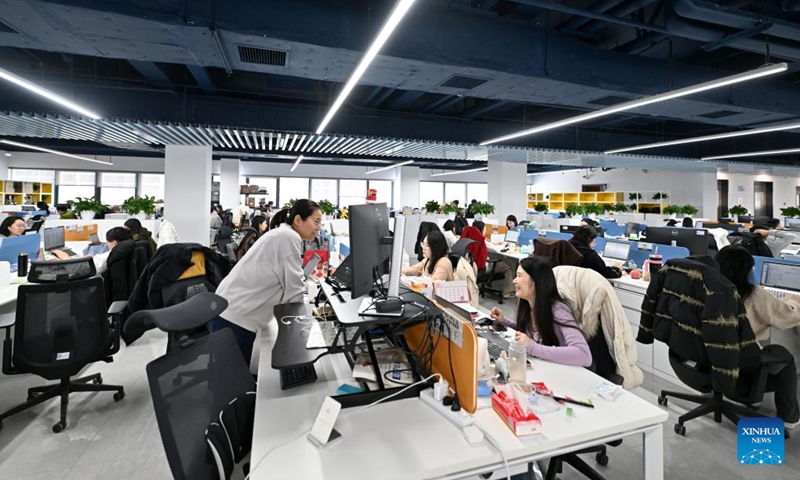Political advisors propose measures to enhance workers' rights protection, 'invisible overtime' highlighted

Employees exchange ideas at the Tianjin R&D Center of Beijing Jingwei Hirain Technologies Co., Inc. in Tianjin, north China, February 26, 2024. Photo: Xinhua
Ahead of the two sessions, political advisors nationwide have put forward various measures to strengthen the protection of workers' rights and interests, among which proposals aimed at addressing "invisible overtime" for employees have attracted great attention.
The protection of the rights and interests of workers has long been a heated discussed topic in China. As the two sessions approach, a survey conducted by the China Youth Daily showed that the proposals for safeguarding labor rights and interests are the most anticipated by respondents, with a selection rate of 49.7% among 2,002 people, according to the media on Thursday.
The Global Times noticed that various measures on protecting the rights and interests of workers have been proposed by political advisors ahead of this year's two sessions, among whom some were particularly concerned about the issue of employees being arranged to work overtime illegally via social media platforms.
Lü Guoquan, a member of the 14th National Committee of the Chinese People's Political Consultative Conference (CPPCC) and director of the general office of the All-China Federation of Trade Unions, suggested introducing the right to disconnect at the legislative level of labor law to increase the illegal cost of "invisible overtime" in enterprises.
Lü elaborated on the concept of the right to disconnect, emphasizing that it grants employees the freedom to decline working via digital platforms beyond their designated work hours. He added that information technology has blurred the boundaries between work and life, as some employers require workers to join group chats, and work can still be arranged through online means after work hours, which means that employees' rights to rest and privacy are not guaranteed.
The political advisor suggested clearly defining online overtime and compensation for work hours. Moreover, employers should be guided to include clauses in labor contracts defining and compensating for the right to disconnect, and stipulate standards for compensating for online overtime on a case-by-case basis.
In addition, law enforcement agencies should strengthen supervision and punishment for "invisible overtime" by employers, Lü suggested, noting that the mechanism for protecting the rights of workers should be improved so that they have channels to seek redress when facing unreasonable and unpaid overtime.
According to the Beijing Daily on January 23, in a case detailed in the yearly working report by the Beijing High People's Court, an employee successfully won a lawsuit against her employer and received compensation for working via social media applications during off-duty hours. The case attracted great public attention and was hailed as a typical example of the strength of the country's judicial system.
Apart from the proposals on overtime issues, the Global Times also noticed that political advisors are paying attention to how to protect the rights and interests of workers in new forms of employment.
Li Xiaoxuan, a member of the 14th National Committee of the CPPCC and chairman of China New Higher Education Group Limited, noted that the rapid development of economic forms, such as the platform economy and sharing economy, has given rise to a large number of new employment forms, which involve multiple subjects such as platforms, users, workers and labor dispatch agencies. However, the legal definition of the relationship between workers in new employment forms and employers is relatively vague.
Due to this vagueness, Li suggested a revision on relevant labor law and establishment of a social security system that is adapted to new forms of employment, as well as enhancing research to clarify the rights and responsibilities of different subjects, the Global Times learnt on Thursday.
Li also proposed increasing policy supply for new forms of employment, including appropriately relaxing policy conditions such as household registration and employment assistance, and providing more policy support in areas such as social security and entrepreneurship subsidies.
Analysts noted that the proposals will help relevant departments conduct thorough research, leading to the development and implementation of effective policies that will bring about tangible improvements in addressing the current issues of worker rights violations.
The measures mentioned above also reflect the diverse needs of society for labor law protection, and may contribute to the improvement of existing labor regulations, which will have significant effects for the long-term improvement of labor rights protection, the analysts said.



